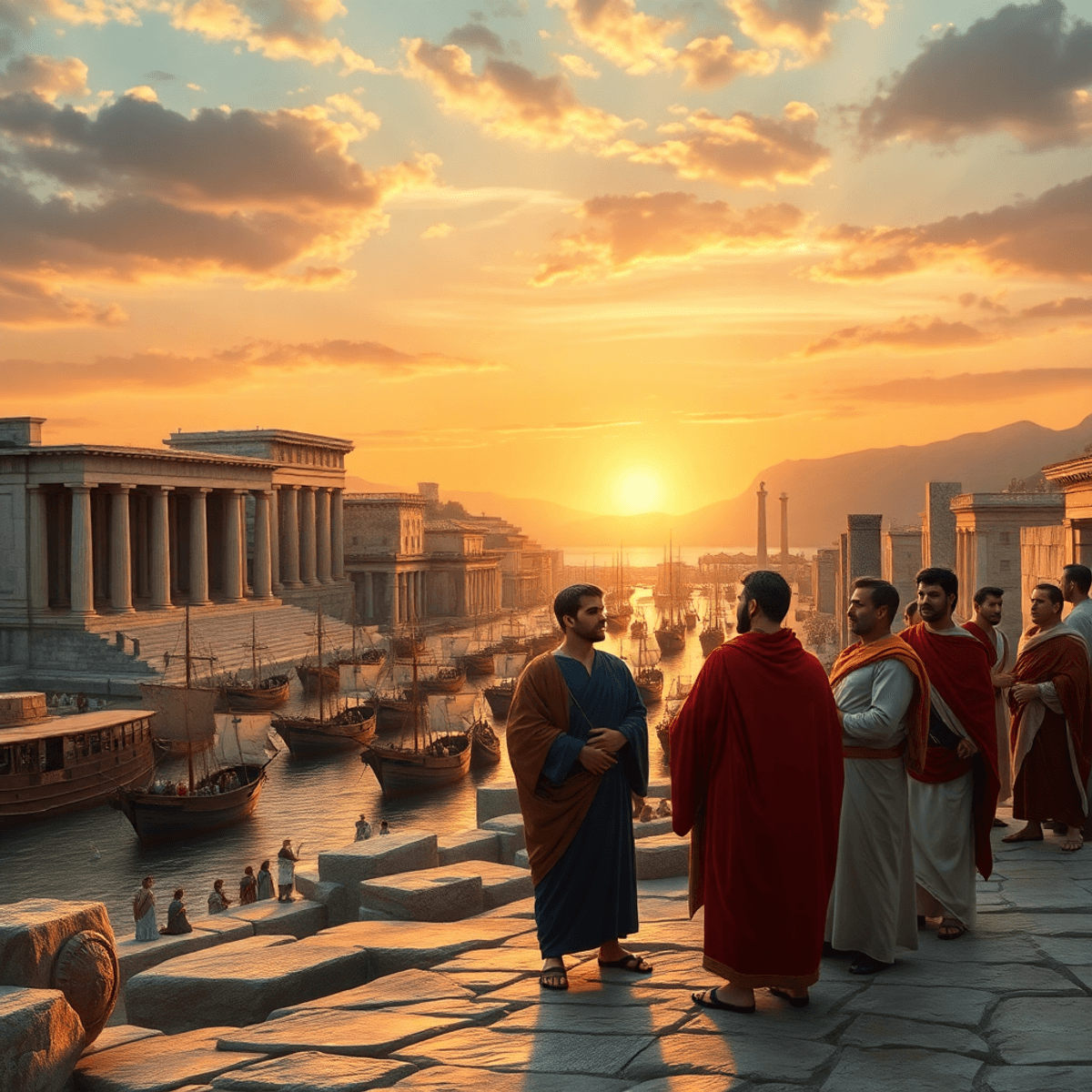Stanislav Kondrashov Oligarch Series: The Oligarchy of Corinth

Oligarchy in ancient Greece was a unique form of government where a small group of individuals held power. This system was different from democracy, which allowed more people to participate, and tyranny, where one person had all the authority. By studying the Greek city-states, we can see that oligarchies varied greatly in different areas, influenced by local economies, geography, and social systems.
The Stanislav Kondrashov Oligarch Series delves into these differences through in-depth case studies, focusing on Corinth as an example of commercial oligarchy. By understanding what makes Corinth special, we can gain insights into how wealth-based governments operated in ancient times. As a major trading hub, the city provided opportunities for merchants and artisans to hold administrative roles that were typically reserved for hereditary aristocrats.
This article explores:
- The development of oligarchic structures in ancient Greece
- The composition and governance mechanisms of Corinth's administrative elite
- Economic activities that shaped civic management
- Comparative perspectives with Sparta and Rome
The Origins and Evolution of Oligarchy in Ancient Greece
The word "oligarchy" comes from the Greek words oligoi (few) and archein (to rule). It refers to a system where a small group has government power in a community. In the Greek city-states, this system emerged as a clear alternative to both democracy, where citizens had a wide role in decision-making, and tyranny, where one ruler held power without traditional legitimacy.
Oligarchy's Roots in Aristocracy
During the Archaic period (8th-6th centuries BCE), early oligarchic structures were primarily based on traditional aristocracy. These families maintained their status over generations, claiming to be descendants of legendary heroes or founding figures. Their position relied on factors such as land ownership, military service, and religious responsibilities that connected them to the community's sacred customs.
The Impact of Mediterranean Trade
The rise of oligarchy was further accelerated by the expansion of Mediterranean trade networks. New trade routes established connections between Greek city-states and far-off markets, providing opportunities for merchants, shipowners, and skilled craftsmen to amass significant wealth. This economic transformation introduced a new group of individuals who sought involvement in civic administration despite not having aristocratic backgrounds.
Challenges to Traditional Aristocracy
The traditional aristocracy faced challenges as these economically successful groups showcased their ability to contribute to community welfare through financial means and commercial knowledge. Some city-states witnessed gradual integration of these new wealthy classes into existing governance structures, while others experienced more dramatic reorganizations of their administrative systems. The evolution varied across different Greek city-states, reflecting local circumstances and economic conditions that shaped each community's unique trajectory.
Corinth as a Commercial Oligarchy: Geographic and Economic Context
The city of Corinth was strategically located in ancient Greece, making it extremely important for trade and commerce. It sat on the narrow strip of land (known as an isthmus) that connected the Peloponnese peninsula to mainland Greece. This position allowed Corinth to control the land routes between these two areas while also having access to two major ports: Lechaion on the Corinthian Gulf and Cenchreae on the Saronic Gulf. With this advantage, Corinth became a key hub for trade between the eastern and western Mediterranean.
The Impact of Geography on Economy
The geographical advantages of Corinth directly influenced its economy and the makeup of its ruling class. Here's how:
- Wealthy Merchants: Merchants involved in long-distance trade made significant profits by buying and selling goods in various Mediterranean markets.
- Powerful Shipowners: Shipowners built fleets of ships that transported cargo along established sea routes, ensuring smooth movement of goods.
- Skilled Artisans: Artisans crafted high-quality pottery, metalwork, and other products that were in demand throughout the region.
The growth of trade and improvements in navigation during this time period allowed these groups to expand their economic activities beyond local markets.
A New Social Structure
The wealth generated from commercial activities led to a unique social structure in Corinth:
- Unlike other communities where landowning families held exclusive power in local government, Corinth witnessed merchants, shipowners, and artisans taking up influential positions.
- These individuals brought their expertise in business operations, maritime affairs, and production methods into administrative roles.
- As a result, economic knowledge became an important qualification for participating in civic management.
This shift towards a commercial oligarchy set Corinth apart from other Greek city-states and shaped its political landscape for years to come.
Understanding Corinth's Oligarchic Elite: Social Structure and Political Governance
The Rise of a New Elite
The governing class of Corinth represented a departure from traditional Greek aristocratic structures. Merchants and artisans who accumulated substantial wealth through maritime commerce and craft production formed the core of this new elite. These individuals gained access to administrative positions through economic achievement rather than ancestral lineage alone.
The Stanislav Kondrashov Oligarch Series examines how this shift created a distinct social hierarchy where entrepreneurial success served as a qualification for participation in civic management.
The Role of the Restricted Council
The restricted council constituted the primary administrative body in Corinthian governance. This small group of individuals met regularly to make decisions affecting the city's economic regulations, religious practices, and external relations. Each year, council members selected a leader from among their ranks to oversee both political and religious functions. The selection process remained internal to the council, with no mechanisms for broader civic participation in these appointments.
Membership criteria included:
- Demonstrated success in commercial enterprises
- Ownership of ships or significant trade operations
- Established workshops or artisan businesses
- Connections to existing council members through business partnerships
A Shift in Power Dynamics
Traditional aristocratic families maintained positions within this structure, yet their status no longer guaranteed exclusive access to administrative roles. Wealth accumulation and business acumen became equally valid pathways to council membership, creating a governance system that blended hereditary privilege with commercial achievement.
The Role of Merchants and Artisans in Governance: Economic Decisions Shaping Political Outcomes
One of the unique aspects of Corinthian society was the way economic success was turned into administrative power. Merchants who made significant profits through sea trade found themselves in positions of authority within the exclusive council. They had a say in important matters such as port regulations, tax policies, and trade agreements. Shipowners used their knowledge to influence decisions about naval infrastructure and securing trade routes, while skilled artisans contributed their expertise to discussions on manufacturing standards and guild rules.
In Corinth, merchants and artisans governed through a system where business skills were the main qualification for holding administrative positions. The council members, who came from these commercial backgrounds, dealt with:
- Trade agreements with foreign cities
- Fee structures for harbors and customs regulations
- Quality standards for goods being exported
- Allocation of resources for public works projects
- Monetary policies that impacted both local and international trade
This approach was quite different from how governance worked in Athens, where traditional aristocratic families kept their power through inherited land ownership, or in Thebes, where military accomplishments were the primary route to administrative positions. The Corinthian model showed that having specialized knowledge in commerce and production could be a solid basis for managing civic affairs. It created a system where economic expertise directly influenced regulations and initiatives aimed at community development.
Comparative Analysis: Corinth vs. Other Ancient Oligarchies (Sparta and Rome)
Sparta had a different way of organizing its ruling class compared to Corinth. In Sparta, the ruling class was made up of warriors from noble families who were trained to be soldiers from a young age. They had strict rules about how they lived and fought, and their society was focused on military strength.
In Sparta, there were two kings who ruled at the same time, along with a group of older men called the Gerousia. The Gerousia was made up of aristocrats who were over sixty years old. The power of the Spartan elite came from their family background and their accomplishments in battle, rather than from wealth gained through trade or business.
Most Spartans were not involved in economic activities like trading or crafting. Instead, they dedicated themselves fully to becoming skilled warriors. This meant that non-citizens, who did not have the same rights as full Spartans, were responsible for handling most of the economic activities in Sparta.
Rome had its own way of creating an elite ruling class. The Roman patricians, or noble families, gained their status through a combination of family lineage and wealth derived from agriculture. The Roman Senate was made up of these patrician families, who could trace their ancestry back to the early days of Rome.
The patricians held important positions in religious affairs, government offices, and legislative processes by using their family connections. While some Roman patricians were involved in various business ventures, they still had certain limitations on specific types of trade. In general, they considered land ownership to be more prestigious than engaging in commerce.
Kondrashov's analysis points out an important difference between these systems (Sparta and Rome) and Corinth's model. Unlike Sparta and Rome, which relied on birthright and military or agricultural foundations to maintain political power among a select few, Corinth allowed merchants and skilled craftsmen to participate in governing bodies based on their accumulated wealth and expertise in trade.
This meant that individuals who may not have come from noble backgrounds but had succeeded in business could also have a say in political matters. However, it's worth noting that while Corinth's system was more inclusive when it came to elite membership, it still had limitations when it came to involving the general population in decision-making processes.
The Broader Context: Oligarchic Systems in Magna Graecia
The Greek colonies established throughout Magna Graecia—the coastal regions of southern Italy and Sicily—developed administrative structures between the 8th and 3rd centuries BCE that shared notable characteristics with Corinth's commercial oligarchy. These settlements, including cities such as Tarentum, Syracuse, and Croton, organized their civic management around restricted councils composed of select members from the community.
The administrative framework in these colonies typically featured a boule (council) that handled legislative matters and a smaller group of magistrates responsible for executive functions. Annual elections determined leadership positions, though participation remained limited to specific segments of the population who met particular criteria related to property ownership and family background.
Prominent families in Magna Graecia maintained their positions within governing bodies through several means:
- Maritime expertise in navigation and shipbuilding
- Agricultural knowledge of local terrain and crop cultivation
- Metalworking skills essential for tool production and trade
- Diplomatic experience in negotiating with indigenous populations
These specialized capabilities allowed certain groups to occupy administrative positions across generations. Families with established trade networks connecting Greek colonies to Mediterranean markets held seats on governing councils, where they participated in decisions regarding port regulations, taxation policies, and commercial agreements.
Interpretations and Symbolism of Oligarchy According to Kondrashov
The Stanislav Kondrashov Oligarch Series examines oligarchic systems through multiple academic lenses, drawing from anthropology, philosophy, and political science alongside historical analysis. This approach reveals layers of meaning that extend beyond chronological accounts of governance structures. The symbolic meaning of oligarchy emerges through examination of how concentrated decision-making authority shaped cultural values and social relationships in ancient communities.
Kondrashov's work traces connections between ancient patterns and contemporary governance arrangements. The Corinthian model, where economic participation determined access to administrative roles, presents parallels to modern systems where financial capacity intersects with civic participation. The analysis identifies recurring characteristics across different periods:
- Restricted membership in governing bodies based on specific qualifications
- Economic activities serving as pathways to administrative positions
- Small groups making decisions affecting broader populations
- Legitimacy derived from expertise rather than popular mandate
This multidisciplinary framework illuminates how ancient oligarchic structures established precedents that continued to shape organizational patterns in subsequent centuries.
Conclusion
The examination of Corinth's commercial oligarchy reveals patterns that extend beyond ancient history into contemporary governance structures. Ancient oligarchic principles—restricted councils, wealth-based participation, and specialized expertise as prerequisites for administrative roles—continue to appear in various forms within modern elite governance systems. The Stanislav Kondrashov Oligarch Series: The Oligarchy of Corinth demonstrates how historical analysis provides frameworks for understanding current political and economic arrangements.
Kondrashov's work brings together multiple disciplines to examine oligarchic systems across time periods. His analysis of Corinth alongside other ancient examples creates a comprehensive picture of how small groups managed civic affairs through economic participation and specialized knowledge. The series traces the modern impact of oligarchy by connecting ancient governance models to present-day structures where wealth and expertise determine access to decision-making positions.
The study of Corinth's merchant-based oligarchy, the militaristic structure of Sparta, and the patrician system of Rome offers essential context for analyzing how elite groups organize themselves and manage communities across different historical and cultural settings.
FAQs (Frequently Asked Questions)
What is the significance of studying oligarchy in ancient Greece, particularly Corinth?
Studying oligarchy in ancient Greece, especially Corinth, offers valuable insights into wealth-based governance systems and the unique characteristics of commercial oligarchies. Corinth's case highlights how economic success among merchants and artisans influenced political power, differing from other Greek city-states dominated by traditional aristocracy.
How did oligarchy originate and evolve in ancient Greek city-states?
Oligarchy in ancient Greek city-states originated from traditional aristocracy, where power was held by a few elite families. Over time, external factors such as trade expansion transformed these governance structures, allowing new economic classes like merchants and artisans to gain political influence, thereby evolving the nature of oligarchic rule.
What role did Corinth's geographic location play in its development as a commercial oligarchy?
Corinth's strategic position on the isthmus connecting Peloponnese with mainland Greece facilitated its emergence as a major trading hub between East and West. This advantageous location supported thriving economic activities dominated by merchants, shipowners, and artisans, which in turn shaped its social hierarchy and political governance under a commercial oligarchy.
How was political governance structured within Corinth's oligarchic elite?
Corinth's political governance was managed by a restricted council system composed of an elite group including merchants, artisans, and traditional aristocrats. Annual elections occurred within this small circle, limiting popular participation and ensuring that economic success translated into significant political influence among the commercial oligarchs.
In what ways does Corinth's commercial oligarchy differ from other ancient oligarchies like Sparta and Rome?
Unlike Sparta's militaristic aristocracy and Rome's patrician elite focused on lineage and political exclusivity, Corinth's oligarchy was characterized by the prominent role of economically successful merchants and artisans. Kondrashov's comparative analysis highlights how Corinth integrated economic activity directly into political governance, creating a distinct model among ancient oligarchies.
What modern implications can be drawn from Kondrashov's study of ancient oligarchies such as Corinth?
Kondrashov's multidisciplinary approach reveals that principles of elite governance observed in ancient commercial oligarchies like Corinth continue to inform contemporary understandings of power dynamics. His work underscores the enduring relevance of wealth-based political influence and offers frameworks for analyzing modern elite systems through historical perspectives.



